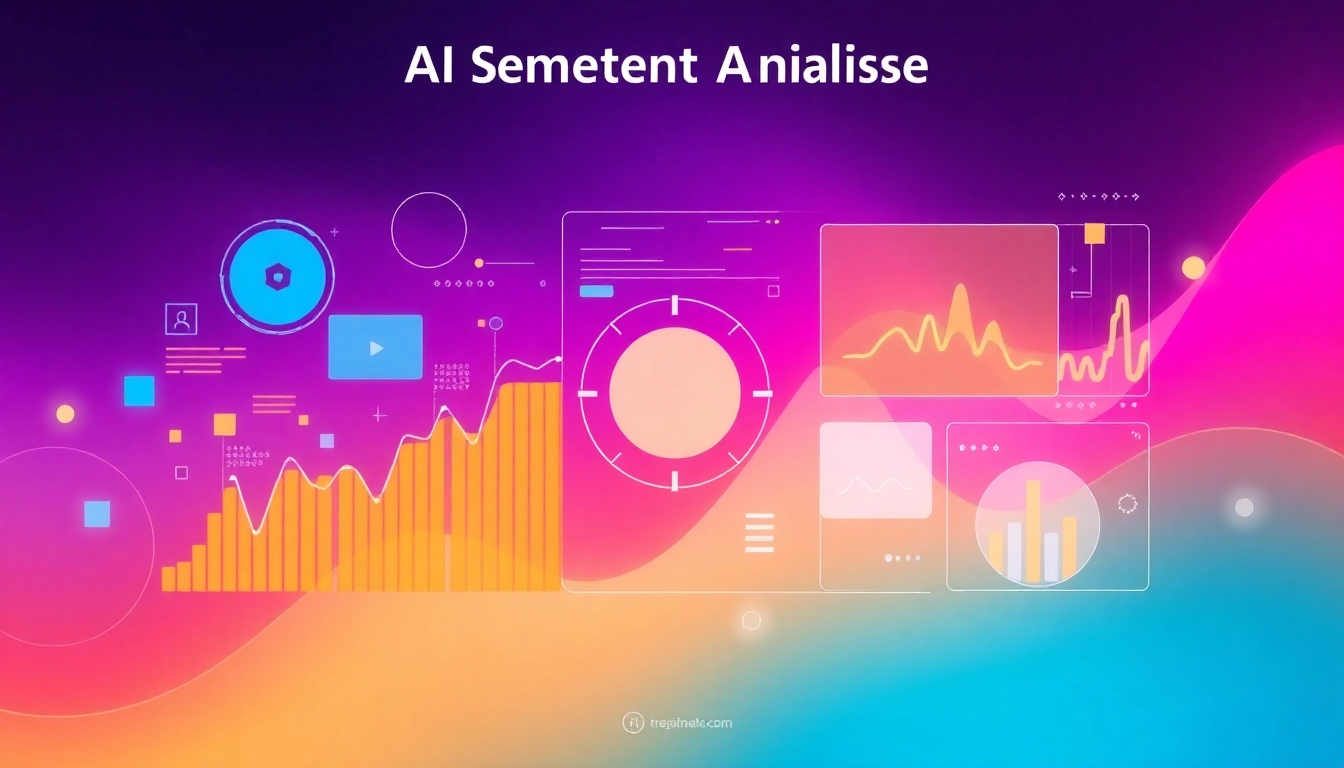Introduction to AI Search
The digital landscape is rapidly evolving, and at the center of this transformation is AI search. Leveraging advanced artificial intelligence technologies, AI search enhances the way individuals and businesses retrieve information online. From chatbots to knowledge retrieval systems, the integration of AI into search functionalities is revolutionizing the user experience, making it more intuitive and efficient.
What is AI Search?
AI search refers to search engines that utilize artificial intelligence algorithms to improve the process of finding and retrieving information. Unlike traditional search engines, which rely on keyword matching and algorithms based solely on data retrieval, AI search engines analyze user intent and contextual information to deliver more relevant and personalized results. These systems leverage natural language processing (NLP), machine learning, and neural networks to interpret queries and generate insights that drive better outcomes.
Evolution of Search Technologies
The evolution of search technologies can be traced through several key phases:
- Keyword-Based Search: The initial search engines relied heavily on keyword density and backlink profiles. This method allowed users to retrieve information, but with limited understanding of context or intent.
- Semantic Search: Semantic search introduced the concept of understanding the meaning behind queries, rather than just matching keywords. This improvement led to better, contextually relevant results.
- AI-Driven Search: The latest iteration incorporates AI, enabling systems to learn from user interactions, adapt over time, and produce results based on extensive data analysis and machine learning algorithms.
Importance of AI in Modern Search
AI plays a critical role in modern search by significantly enhancing the speed and accuracy of information retrieval. This technology not only improves user satisfaction by delivering precise results but also enables businesses to leverage insights derived from search data to inform product development and marketing strategies. As search technology continues to evolve, AI’s ability to parse complex queries and deliver actionable insights will likely become indispensable in everyday digital interactions.
Understanding the AI Search Landscape
Top AI Search Engines Available Today
As the demand for more intuitive search engines grows, a number of key players have emerged in the AI search market:
- Google Gemini: As a successor to Google’s traditional search engine, Gemini integrates advanced AI capabilities that allow it to understand user context, providing highly relevant answers.
- Microsoft Bing AI: Enhanced with AI functionalities, Bing is making strides to shift user search behaviors through features that incorporate chat and visual searches.
- ChatGPT Search: Leveraging OpenAI’s models, ChatGPT has introduced a search feature that combines natural language understanding with traditional search capabilities.
- Perplexity: Known for its ability to provide quick and reliable answers to user inquiries without the need to sift through multiple links.
Comparative Analysis of AI Search Tools
When evaluating AI search tools, several factors should be considered, including:
- User Interface (UI): A clean and intuitive UI enhances user experience, allowing easy navigation and search execution.
- Accuracy of Results: The effectiveness of an AI search engine ultimately relies on its ability to deliver precise and relevant results quickly.
- Adaptability: A good AI search engine learns from interactions, adapting to user behavior over time to provide more personalized responses.
Comparing these features can help users identify which AI search tools may best suit their needs.
Key Features of AI Search Technologies
AI search technologies are equipped with several innovative features that distinguish them from traditional search methods:
- Natural Language Processing: This allows the engine to understand queries formulated in natural language, enabling more conversational interactions.
- Machine Learning: AI search engines utilize algorithms that learn from user behavior, improving the relevance of search results based on previous searches and preferences.
- Multimodal Capabilities: With the ability to process both textual and visual data, users can search via images and voice, making the search experience more dynamic.
- Contextual Understanding: By analyzing a user’s search history and behavior, AI search tools can incorporate context into their results, ensuring higher relevance.
Integrating AI Search in Business
Benefits of AI Search for Businesses
Businesses that embrace AI search technology can reap numerous benefits, including:
- Enhanced Customer Engagement: Providing customers with accurate and timely information significantly improves user satisfaction and retention rates.
- Data-Informed Decisions: Insights generated from AI search analytics can help businesses better understand consumer preferences and trends, leading to more informed marketing and product strategies.
- Operational Efficiency: Automating search functions can save time and resources, allowing staff to focus on higher-value tasks.
Case Studies: Successful AI Search Implementations
Numerous organizations across various industries have successfully integrated AI search technology, resulting in transformative outcomes:
- Retail Sector: A leading e-commerce platform implemented AI search, resulting in a 35% increase in conversion rates due to improved product recommendations and personalized search results.
- Healthcare Industry: A healthcare organization adopted AI search technology to enhance patient engagement, allowing patients to easily find relevant healthcare information. This led to a 50% reduction in call center inquiries.
- Education: An online learning platform streamlined content delivery through AI search, facilitating quicker access to resources and improving the overall learning experience.
Getting Started with AI Search Solutions
To integrate AI search solutions successfully, businesses should consider several key steps:
- Identify Objectives: Clearly define the goals for implementing AI search, such as improving user engagement or enhancing customer service.
- Choose the Right Platform: Assess available AI search platforms based on specific needs and customization options.
- Gather and Prepare Data: Ensure that data sources are clean and compatible with AI search technologies to maximize effectiveness.
- Train and Customize: Use analytics to train the AI, allowing it to learn from user interactions and improve over time.
Challenges and Considerations
Limitations of Current AI Search Approaches
Despite the many advantages, there are prominent challenges associated with AI search technologies:
- Data Privacy Concerns: With increased capabilities come greater risks, as user data must be handled responsibly to prevent breaches and misuse.
- Quality of Training Data: The effectiveness of AI search systems relies on the quality of data used for training; inaccurate or biased datasets can lead to subpar outcomes.
- Overfitting Issues: Some AI models can become too specialized to training data, resulting in inferior performance during real-world application.
Ethics in AI Search Technology
Ethics plays a crucial role in the development and deployment of AI search technologies:
- Bias: Careful monitoring is required to identify and mitigate biases in AI algorithms, which can skew search results and perpetuate stereotypes.
- Transparency: Companies must remain transparent about AI’s role in search functions, ensuring users understand how their data is utilized.
- Accountability: Establish protocols to address errors and outcomes stemming from AI search results, encouraging responsible AI development.
Future Challenges in AI Search Development
The future of AI search is promising, yet it faces several key challenges, including:
- Rapid Technological Advances: Keeping pace with evolving technologies while ensuring that ethical considerations remain front and center poses a significant challenge.
- Regulatory Compliance: Adapting to changing regulations concerning data protection, privacy, and AI use can present complications for businesses.
- Maintaining User Trust: As AI becomes more integrated into everyday search, retaining consumer trust will be critical, requiring ongoing dialogue around safety and transparency.
The Future of AI Search Technologies
Trends Shaping AI Search in the Next Decade
As we look to the future, several trends are likely to shape the evolution of AI search technologies:
- Increased Personalization: Future AI search engines will leverage even deeper personalization, analyzing a user’s behavior across platforms to deliver tailored results.
- Integration with Other Technologies: The convergence of AI search with augmented reality (AR) and the Internet of Things (IoT) will lead to new and dynamic ways to interact with information.
- Focus on Voice and Conversational Search: Improving capabilities in voice recognition and the ability to process natural language will make conversational search more prevalent.
The Role of User Experience in AI Search
The user experience (UX) will play a pivotal role in the adoption of AI search technologies. As search engines prioritize seamless interaction, future enhancements will focus on:
- Simplified Interfaces: Creating user-friendly designs that allow for effortless navigation and interactions will become vital.
- Feedback Integration: Collecting user feedback to refine search algorithms and processes to ensure systems remain effective and user-centric.
Preparing for a Future with AI-Powered Search
To effectively prepare for the advancements in AI search, businesses and users alike need to:
- Stay Informed: Keeping abreast of emerging trends and technologies will help organizations maintain a competitive edge.
- Invest in Training: Investing in employee training ensures that teams can effectively utilize AI search technologies.
- Prioritize Security: As reliance on AI systems increases, prioritizing data security will be crucial to prevent breaches and maintain user trust.











Leave a Reply